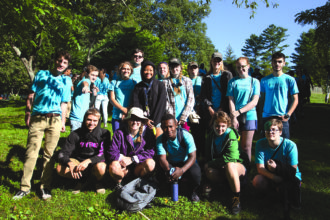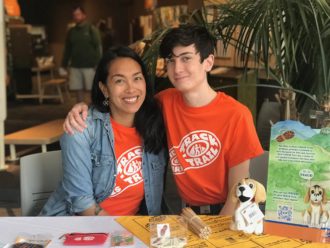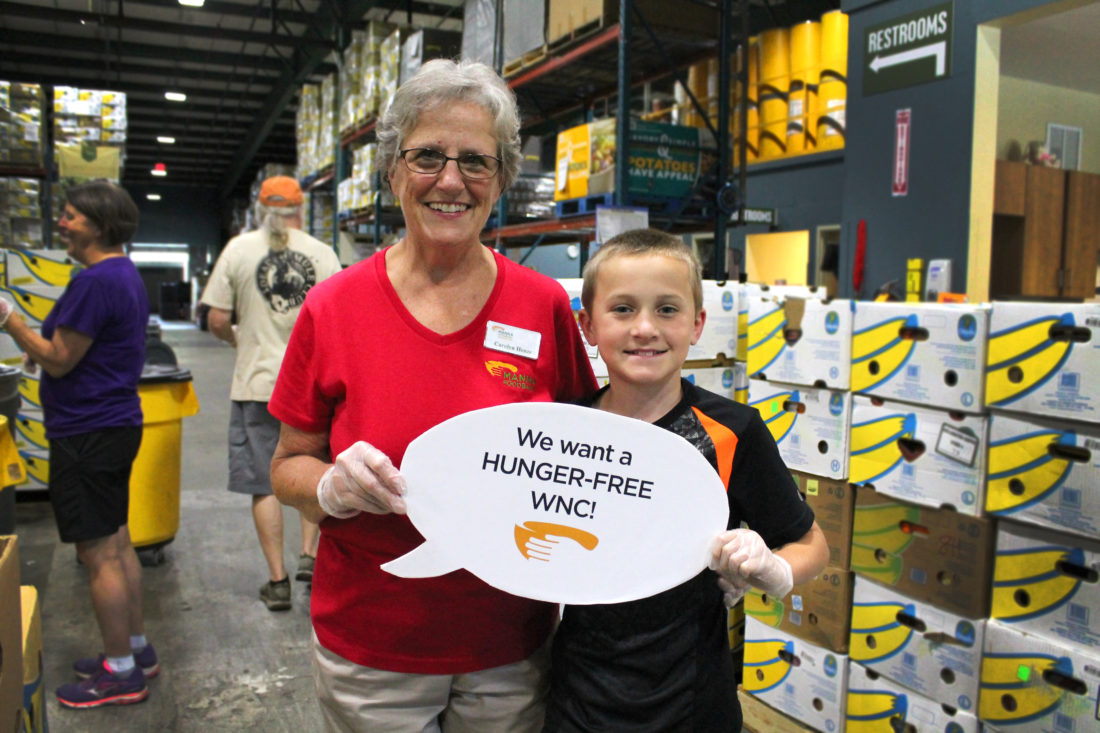It’s no secret that many families in today’s world feel crunched for time as school, work and extracurricular activities keep everyone moving at a breakneck pace. “My kids’ schedules have gotten increasingly busy with sports and activities that happen after school and on the weekends,” says Asheville resident and mother of four Stephanie Harper. “Plus, they want to hang out with their friends.”
But despite their hectic schedules, Harper, along with her husband and children, make up six of the over 7,000 volunteers that together provided 73,729 hours of support — the equivalent of 37 full-time staff positions — to MANNA FoodBank in the 2017-18 fiscal year.
Harper says volunteering is a value that her family happily makes time for. “We don’t force our kids to volunteer,” says Harper. “We ask them. And they’re always excited to go.
“The great thing about volunteering at MANNA is that there is no age limit,” continues Harper, who admits it can be a struggle to find an organization that will allow all of her family to volunteer, including her 4-year-old daughter. “We volunteer every 2-3 months. Poppy, my youngest, can pack food. It’s great — they all know her there.”
Families untied
As families deal with competing demands, organizations that use volunteers have learned that flexibility is key to recruitment and retention. “We design our volunteer opportunities to be cross-pollinating,” says Jack Henry, human resources manager at the YMCA of Western North Carolina. The YMCA has been led by volunteers in the region for over 100 years and uses around 1,200 volunteers annually, about half of whom are kids.
The YMCA, says Henry, understands that volunteer opportunities are most effective when they are connected to activities children are already involved in. “We want to make sure that it makes sense for families to be involved in volunteering, whether that’s because it is taking place at their children’s school, or at the YMCA that they were already going to be a part of, or an event co-sponsored by their faith community,” he explains. “We have several full-time employees and volunteers whose job it is to seek out community partnerships.”
The Junior League of Asheville also recognizes the importance of flexibility to its volunteer base. Women join the organization to acquire training and leadership skills through fundraising and projects that identify and take on community issues. “One question we’ve asked ourselves is, what other types of service could members give besides direct service?” says Rebecca Cecil, vice president of community at the Junior League. “We’ve looked at advocacy, coalition building, grant making — if people can’t physically give their time, can they be at home helping advocate for something online, or could they be doing some coalition building with the community?”

For Girl Scouts Carolinas Peaks to Piedmont, that adaptability extends to the roughly 600 K-12 girls participating in Buncombe County troops. Volunteering is a core value of the organization, which hosts Take Action Projects designed to go beyond community service and create long-term change in the community. But, as Director of Troop Experience Laura Allison points out, “Life is busy.”
To accommodate girls that can’t make it to every Girl Scouts meeting, the organization recently rolled out a new resource for troop leaders called the Volunteer Toolkit. Those leaders now have the ability to email the parents of absent scouts with concrete steps for meeting troop goals. “If a girl misses a meeting, there are now a lot of ways for her to catch up,” explains Allison. “We try to be as flexible as possible.”
Breaking barriers
No matter how volunteers decide to get involved, Henry says, it’s imperative that nonprofits smooth the process of participation. “Technology is a must. It has to be simple and easy for volunteers to view opportunities, apply, be background checked, trained for child abuse prevention, and be on the ground volunteering as soon as possible,” he says. “We try to make it as easy and headache-free as possible.”
“We try to be as accommodating as we can,” says Melissa Kledis, president of the Junior League of Asheville. For decades, she explains, the Junior League used to hold its general membership meetings during the day, because the bulk of its members were women who did not work outside of the home.
Today, however, “about 95% of our membership work full-time, so to continue to have daytime meetings would not work for anyone,” Kledis says. “We are trying to find a way to make this work for people so that we can accommodate busy lives and busy schedules.”
The Junior League also hosts a Volunteer Expo each February, which features roughly 70 local nonprofits seeking help. Similar to a job fair, the event brings many nonprofits together in one place so people thinking of volunteering can find a good fit.
“The idea is to help people that want to get involved and volunteer but aren’t sure where to start,” says Jessica Coffield, president-elect of the Junior League of Asheville. “Or maybe they want to volunteer as a family, but they don’t know who will allow them to bring along their 10-year-old.”
Make the time
“Family and friends often ask how we are able to volunteer with our schedules. The answer is that we just do it.” says Harper. But she adds that the act of volunteering alone isn’t enough to form a consistent habit — it’s also important to talk to kids after they’ve volunteered so they understand the impact they’re making in the community.
“If you schedule time to volunteer and you don’t talk to your kids about it afterwards, they’ll feel no real connection, and they’re not going to want to do it,” Harper says. “We tell our kids, ‘Hey, we packed so many pounds of food today, and you guys rocked it.’ And we explain the different programs that are going to be affected because of their help.”
“People make time for things that are important to them,” says Kledis, whose own president role at the Junior League is a volunteer position. “I work full time and I have three kids, but it’s important to me to give back, and it’s important for my kids to see that you can’t live your life in a silo.”
As a parent herself, Allison with the Girl Scouts understands the struggle to keep up with everything her child is participating in. “It has to be intentional,” she says. “Parents have to decide what they want their child involved in and then make it a priority.”
Kids these days

Harper says that volunteering has had a big impact on her own family. Her oldest son added his volunteer experience to his resume, and she believes that helped him land his first job at Target. But in addition to giving him a real-world advantage, she says, his years of volunteerism are reflected in the decisions he makes at school.
Just this year, Harper’s son started a UNICEF Club at Asheville High School. “That feels good,” she says. “He is naturally a kind and giving person, but I hope the supplemental volunteerism as a family engrained in him that helping people is a natural thing to do.”
About her other children, Harper says, “Volunteering has opened their eyes to what is going on around them. They are asking questions about what is going on in the community, like homelessness, and asking about other things we can do. I feel good about that.”
The YMCA receives the same kind of positive response from the kids that volunteer with its programs. “You can see the joy on their faces,” says Henry. “Volunteering teaches them that life isn’t all about them. I think that’s an important childhood development milestone. It also bonds them to their community, and it shows them that volunteering is just a part of normal life.”
And Allison says that the young Girl Scouts readily respond to the call to give back to their communities. “They want their voices heard,” she says. “They want to take an active role in leadership, and they want to make the world a better place. We just have to help support them through that process.”



Before you comment
The comments section is here to provide a platform for civil dialogue on the issues we face together as a local community. Xpress is committed to offering this platform for all voices, but when the tone of the discussion gets nasty or strays off topic, we believe many people choose not to participate. Xpress editors are determined to moderate comments to ensure a constructive interchange is maintained. All comments judged not to be in keeping with the spirit of civil discourse will be removed and repeat violators will be banned. See here for our terms of service. Thank you for being part of this effort to promote respectful discussion.